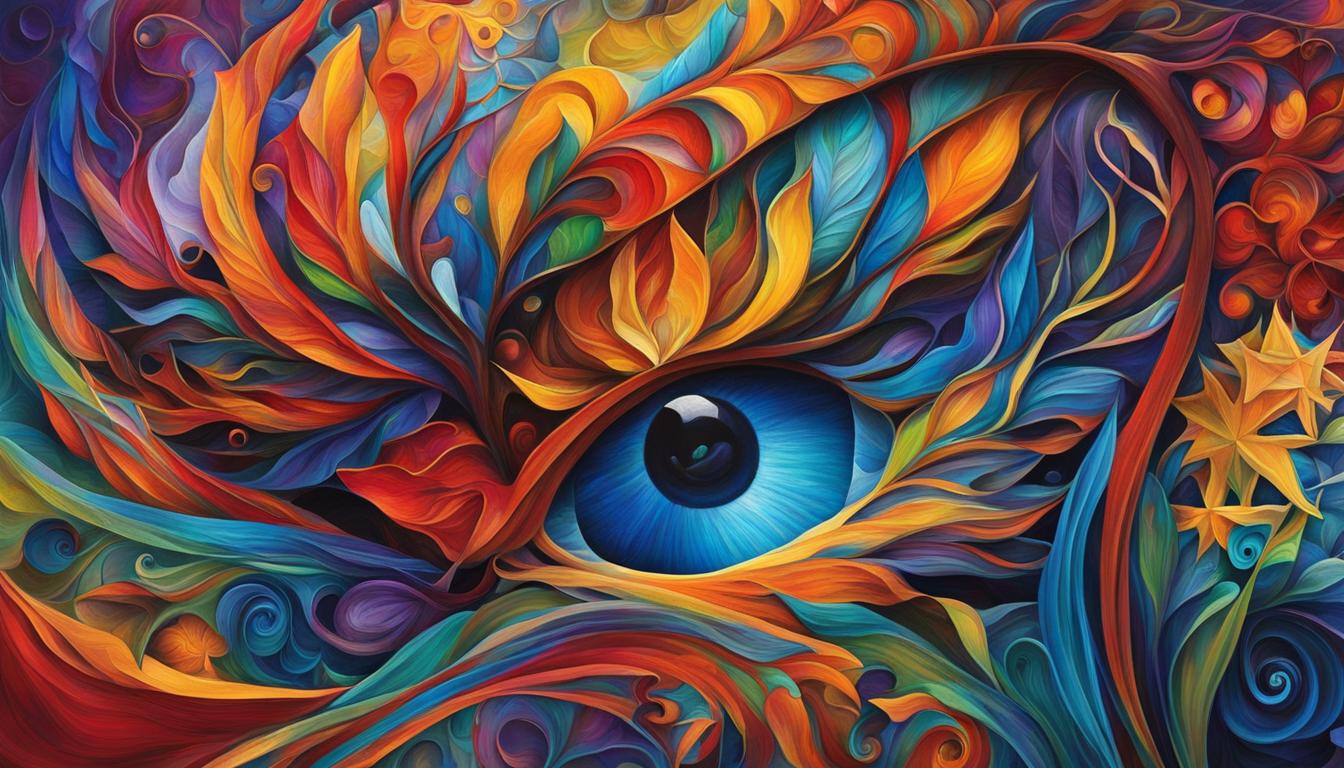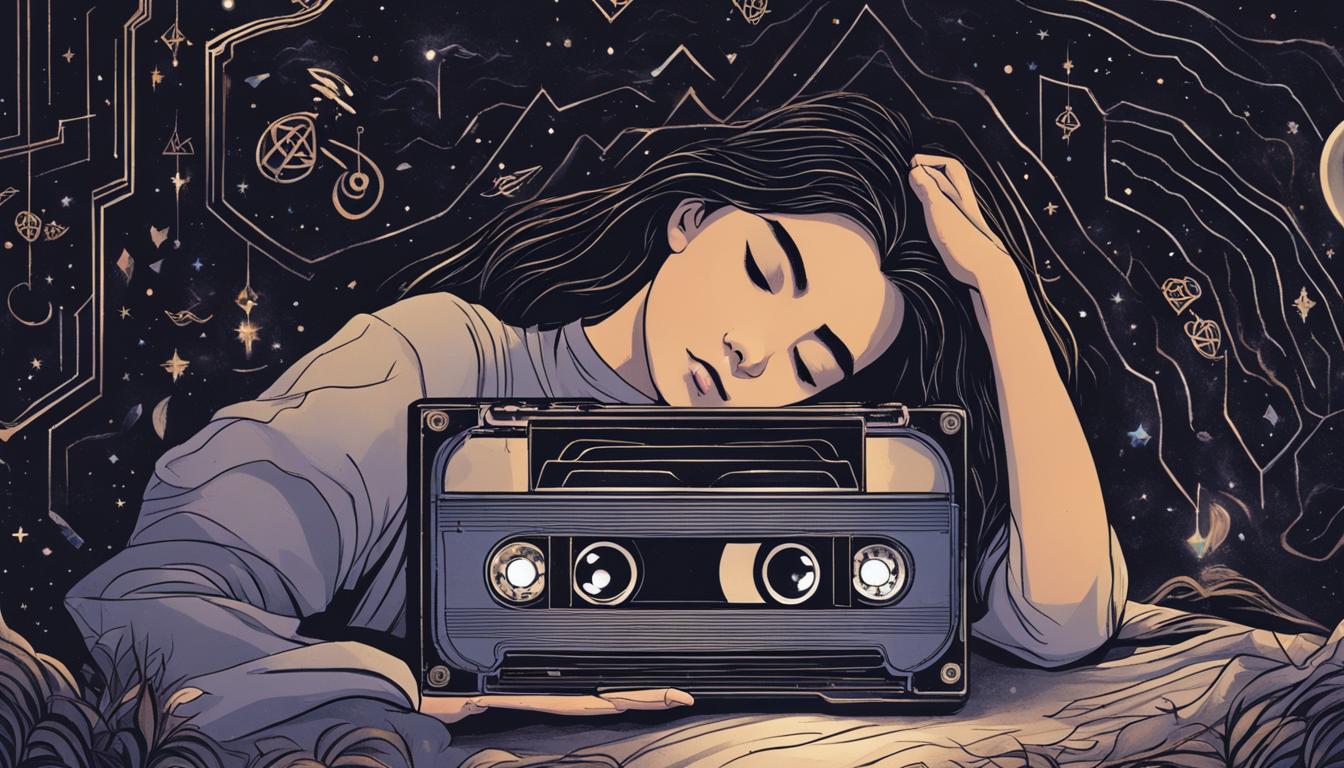Dreams are an intriguing phenomenon that can provide insight into our subconscious thoughts and emotions. Dreaming about a camera can have symbolic interpretations that reveal aspects of our lives and inner selves. Let’s explore the meaning of dreaming about a camera in more detail.
Key Takeaways:
- Dreams offer a glimpse into our subconscious minds and can reveal hidden aspects of ourselves.
- Dreaming about a camera can have symbolic interpretations related to capturing memories, self-expression, or surveillance.
- Understanding the specific meaning of your camera dream requires personal reflection and analysis of its context and your own experiences.
- Camera symbolism in dreams can vary based on individual perspectives and associations with cameras.
- Exploring dream meanings can deepen self-awareness and provide valuable insights into our inner selves.
Why are dreams so weird?
Dreams have always fascinated and perplexed us. They can take us on wild adventures, introduce us to bizarre characters, and defy the laws of physics. But why are dreams so weird? Research suggests that the answer lies in how our brain processes and consolidates memories during sleep.
During REM sleep, the stage of sleep associated with dreaming, our brain’s hippocampus becomes disconnected from the signals that control eye movement. This disconnection prevents specific memories from being accessed while we dream. However, general memories of people and places remain accessible. As a result, our dreams often feature emotional narratives that draw on these general memories, leading to the creation of surreal and strange scenarios.
For example, imagine dreaming about flying. While it may seem odd, the dream is likely based on the general memory of what it feels like to be weightless and the emotional desire for freedom. Without the ability to access specific memories, our brain weaves together these fragments to create the strange and fantastical experiences we encounter in our dreams.
“Dreams are the touchstones of our character.” – Henry David Thoreau
So, the next time you wake up from a particularly weird dream, remember that your brain is simply processing and consolidating memories in its own unique way. Dreams may seem strange and nonsensical, but they provide valuable insights into the workings of our mind.
| Common Dream Themes | Interpretation |
|---|---|
| Falling | Feeling out of control or overwhelmed in waking life. |
| Being chased | Avoiding or confronting something that is causing stress or anxiety. |
| Teeth falling out | Concerns about self-image or communication issues. |
While the exact reasons for the weirdness of dreams may still elude us, one thing is clear – dreams are a fascinating and integral part of the human experience.
Dreaming Beyond REM Sleep: Exploring the Depths of Dream States
When it comes to dreaming, most of us associate it with the rapid eye movement (REM) sleep stage. However, recent studies have revealed that dreaming actually occurs throughout various stages of sleep. While dreams that take place during deep sleep are often unemotional and non-vivid, it is during REM sleep that we experience the most memorable and intense dreams.
REM sleep, characterized by bizarre scenarios, physical impossibilities, and vivid emotions, offers a unique realm for our imagination to run wild. It is during this stage that our brain creates narratives filled with intricate details and symbols that can leave a lasting impression upon waking. So, while dreams may occur throughout our sleep cycle, it is the dreams that unfold in REM sleep that captivate us the most.
Table: Dreaming Throughout Sleep
| Dreaming Stage | Dream Characteristics |
|---|---|
| Non-REM Sleep | Unemotional, non-vivid dreams |
| REM Sleep | Bizarre scenarios, physical impossibilities, intense emotions |
Understanding the different stages of dreaming can enhance our appreciation for the complexity of the dream world. While dreams that occur during deep sleep may fade from memory, those that unfold in REM sleep often leave a lasting impression, stirring our curiosity and prompting us to explore their meaning and symbolism.
Why are dreams hard to remember?
We’ve all experienced the frustration of waking up from a vivid dream, only to have it slip away from our memory like a fleeting whisper. So why are dreams so difficult to remember? There are several factors that contribute to this phenomenon.
Firstly, the level of brain activity during sleep plays a role in dream recall. Research has shown that individuals who remember their dreams exhibit greater brain activity while both awake and asleep. This heightened brain activity may facilitate the encoding and retrieval of dream memories.
Secondly, the timing of waking up can greatly impact dream recall. When we wake up during or just after a dream, there is a higher likelihood of remembering it. This is because the dream memory is more effectively transferred into long-term storage when we have the opportunity to reflect on it immediately upon waking.
However, disruptions to our sleep cycle, such as alarms that abruptly awaken us from REM sleep, can interfere with dream recall. Even if a dream was in progress, the sudden interruption can hinder the encoding of the dream memory and make it more difficult to remember upon waking.
In summary, the ability to remember dreams varies among individuals and is influenced by factors such as brain activity during sleep and the timing of waking up. While dreams may often elude our grasp, exploring the mysteries of our unconscious mind can provide valuable insights into our thoughts, emotions, and experiences.
The Purpose and Function of Dreams
Dreams have long fascinated humans, and their purpose remains a subject of ongoing debate among researchers. While the exact function of dreams is still not fully understood, several theories provide insights into their significance.
Evolutionary Function of Dreams
One theory suggests that dreams serve an evolutionary purpose, helping us test and rehearse scenarios that are important for our survival. Through dreams, our brain can simulate potential threats and challenges, allowing us to better prepare for real-life situations. This evolutionary function of dreams may explain why we often experience vivid and emotionally intense dreams that reflect our fears, desires, and anxieties.
Emotional Processing in Dreams
Dreams also play a role in emotional processing. During sleep, our brain has the opportunity to process and regulate our emotions, particularly those experienced during the day. Dreams provide a safe space for us to explore and work through unresolved emotions, helping us make sense of our feelings and experiences. This emotional processing in dreams can contribute to our overall psychological well-being.
Creativity and Dreams
Another fascinating aspect of dreams is their potential to inspire creativity. Some of history’s greatest inventions, artworks, and literary works can be traced back to dreams. During the rapid eye movement (REM) stage of sleep when vivid dreams occur, our brain engages in unique neural connections and associations, fostering creative thinking and problem-solving. Dreams can serve as a wellspring of ideas and inspiration, feeding our imagination and promoting innovative thought.
| Dream Purpose | Explanation |
|---|---|
| Evolutionary Function | Dreams may help us test and prepare for survival scenarios. |
| Emotional Processing | Dreams allow us to process and regulate our emotions. |
| Creativity | Dreams can inspire creative thinking and problem-solving. |
While the purpose of dreams continues to elude us, their significance is undeniable. Dreams offer a window into our subconscious mind, enabling us to explore our innermost thoughts, emotions, and experiences. Whether they serve an evolutionary function, aid in emotional processing, or act as a catalyst for creativity, dreams provide a rich and intriguing landscape for self-reflection and exploration.
Do my dreams mean anything?
Many people wonder if their dreams have any significant meaning or if they are just random images and thoughts that occur during sleep. While not all dreams hold deep significance, they can provide valuable insights into our subconscious thoughts and emotions. Dream analysis, or the interpretation of dreams, can be a useful tool for gaining a deeper understanding of ourselves.
When it comes to dream analysis, it’s important to remember that dreams are highly personal and can be influenced by our individual experiences and emotions. Analyzing dreams can reveal hidden desires, unresolved conflicts, and even help process traumatic events from our waking lives. However, it’s crucial to approach dream interpretation with caution as personal biases and unrelated elements can also influence dream content.
Through dream analysis, we can uncover profound insights into our inner selves. It allows us to explore our fears, desires, and aspirations, providing a window into our subconscious mind. By examining the symbols, themes, and emotions present in our dreams, we can gain a better understanding of our thoughts and feelings, ultimately leading to personal growth and self-discovery.
“Dreams are the touchstones of our character.” – Henry David Thoreau
Interpreting Dreams: Seeking Guidance
While dream analysis can be a powerful tool for self-reflection, it’s important to remember that dreams are subjective and can have multiple interpretations. Seeking guidance from a trained professional, such as a psychologist or therapist, can offer valuable insights and help navigate the complexities of dream analysis.
| Benefits of Dream Analysis | Considerations |
|---|---|
|
|
Do Men and Women Dream Differently?
“Dreams are the touchstones of our characters.” – Henry David Thoreau
As we delve into the captivating world of dreams, it’s natural to wonder whether men and women experience these nocturnal adventures differently. While dreams are highly subjective and influenced by our individual experiences, studies have suggested some interesting gender differences in dream content.
Research indicates that women tend to dream equally about men and women, while men predominantly dream about other men. These variations in dream characters may reflect personal interactions and emotional connections experienced in waking life. However, the exact reasons behind these gender differences in dreaming remain a topic of ongoing investigation.
Exploring the nuances of dream content among different genders can provide valuable insights into the complex workings of the human mind. While individual experiences and cultural influences shape dream scenarios, understanding these patterns can shed light on how gender impacts our subconscious thoughts and emotions.
| Gender | Typical Dream Characters | Implications |
|---|---|---|
| Women | Equal representation of men and women in dreams | Potential emphasis on interpersonal relationships and emotional connections |
| Men | More frequent dreams featuring other men | Possible reflection of social dynamics and interactions in daily life |
It’s important to note that dream content is highly personal and can vary widely among individuals, regardless of gender. Dreams are influenced by a myriad of factors, including personal experiences, cultural influences, and emotional states. Therefore, it’s essential to approach dream analysis and interpretation with an open mind, acknowledging the uniqueness of each person’s dream world.
Understanding Gender Differences in Dreaming
While the precise reasons for gender differences in dream content are not yet fully understood, a variety of theories have been proposed. Some researchers speculate that biological and hormonal factors may contribute to variations in dream experiences among men and women. Others suggest that cultural and societal norms play a role in shaping dream content based on gender roles and expectations.
Whether dreams reflect the intricacies of our waking lives, offer a glimpse into our deepest desires, or serve as a platform for emotional processing, they continue to fascinate and mystify us. Exploring the differences in dream content between genders can provide valuable insights into the human mind and how it constructs meaningful narratives while we sleep.
The Intricacies of Dream Interpretation
Dream interpretation has long been a subject of fascination and study for psychologists, delving into the depths of the human mind and its unconscious workings. Two prominent figures in the field, Sigmund Freud and Carl Jung, have provided influential theories on the meaning and significance of dreams.
Freud’s Theory
Sigmund Freud believed that dreams served as a pathway to the unconscious mind, where repressed desires and wishes could be expressed. According to Freud, dreams were a form of wish fulfillment, allowing individuals to satisfy their unconscious desires that were suppressed in waking life. Freud suggested that dreams consisted of manifest content, the literal storyline of the dream, and latent content, the hidden symbolic meaning behind it.
“Dreams are the royal road to the unconscious.”
Jung’s Theory
Carl Jung expanded on Freud’s theories, emphasizing the significance of archetypes and the collective unconscious in dream analysis. Jung believed that dreams contained symbols and images that represented universal human experiences and emotions, known as archetypes. These archetypal elements could provide insights into the individual’s psyche and their connection to the broader human experience.
“Who looks outside, dreams; who looks inside, awakes.”
| Freud’s Theory | Jung’s Theory |
|---|---|
| Focuses on the unconscious desires and wishes | Emphasizes the role of archetypes and the collective unconscious |
| Interprets dreams as wish fulfillment | Interprets dreams as a reflection of the individual’s connection to the broader human experience |
| Discusses manifest and latent content in dreams | Highlights symbols and images as representations of universal experiences |
While Freud’s and Jung’s theories have shaped the foundation of dream interpretation, it is important to note that there are various approaches and perspectives within the field. Dream analysis continues to be an intriguing area of study, providing valuable insights into our inner selves, experiences, and the workings of the human mind.
Exploring the Enigma of Dreams
Dreams have long captivated and intrigued us, offering a fascinating window into the depths of our subconscious minds. As we sleep, our dreams reveal the hidden thoughts, emotions, and experiences that shape our waking lives. They hold significance beyond their mysterious nature, serving as a key to unlocking the secrets of our unconscious minds.
Whether we believe dreams serve an evolutionary purpose, aid in emotional processing, or act as a wellspring of creative inspiration, their importance cannot be denied. They provide a canvas for our deepest desires and fears, offering insights into our innermost selves. By delving into the meaning and symbolism behind our dreams, we embark on a journey of self-discovery.
Dreams act as a bridge between our conscious and unconscious minds. They can reveal unresolved conflicts, unacknowledged emotions, and hidden desires. Paying attention to the themes, symbols, and narratives that unfold in our dreams can provide valuable insights into our lives and personal growth.
So, let us embrace the enigma of dreams and explore the depths of our own minds. By recognizing their significance and delving into their vast landscapes, we have the opportunity to gain a deeper understanding of ourselves and the intricate workings of our subconscious minds.
FAQ
What does it mean when you dream about a Camera?
Dreaming about a Camera can have symbolic interpretations that reveal aspects of our lives and inner selves. It may represent a desire to capture memories or moments, seek clarity or perspective, or express creativity. The specific meaning can vary depending on the context and emotions associated with the dream.
Why are dreams so weird?
The weirdness of dreams can be attributed to how our brain processes and consolidates memories during sleep. The disconnect between the hippocampus and signals of rapid eye movement (REM) sleep allows for the creation of emotional narratives, leading to bizarre scenarios, physical impossibilities, and intense emotions in our dreams.
Do we only dream in REM sleep?
No, dreams can occur throughout the various stages of sleep. However, the most memorable and vivid dreams typically occur during REM sleep, characterized by bizarre scenarios, physical impossibilities, and intense emotions. Dreams during deep sleep are often unemotional and non-vivid, leading to a lack of recall.
Why are dreams hard to remember?
Dream recall can be challenging due to various factors. Dreams that occur during deep sleep are often unemotional and non-vivid, making them less memorable. Additionally, alarms or disruptions that wake us up during or just after a dream can hinder dream recall, even if the dream was in progress.
What are dreams for?
The purpose of dreams is still a topic of debate among researchers. Some theories suggest that dreams serve an evolutionary function, testing us in scenarios important for our survival or soothing the impact of emotional trauma. Others believe that dreams can inspire creative thought and problem-solving, helping us make sense of our waking lives.
Do my dreams mean anything?
While not all dreams hold significant meaning, they can provide insights into our subconscious thoughts and emotions. Dreams often reflect what our brain deems important, based on our daily experiences and emotions. Analyzing and interpreting dreams can be therapeutic and insightful, offering a deeper understanding of ourselves.
Do men and women dream differently?
There may be some gender differences in dream content. Studies have shown that women tend to dream equally about men and women, while men more frequently dream about other men. Gender experiences and interactions may shape dream content, although the exact reasons for these differences are still not fully understood.
What are the intricacies of dream interpretation?
Dream interpretation has been a subject of interest for psychologists for decades. Approaches vary, with Sigmund Freud believing dreams served as wish fulfillment, and Carl Jung emphasizing the significance of archetypes and the collective unconscious. Interpreting dreams can provide valuable insights into our inner selves and experiences.
What can dreams reveal about us?
Dreams offer a glimpse into the depths of our subconscious minds, providing insights into our thoughts, emotions, and experiences. They can help us understand ourselves better and how our mind works. Exploring the meaning and symbolism behind our dreams can lead to a greater understanding of ourselves and our lives.
Note: The SEO relevant keywords have been integrated into the answers to provide a natural flow of information.





